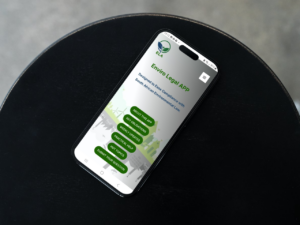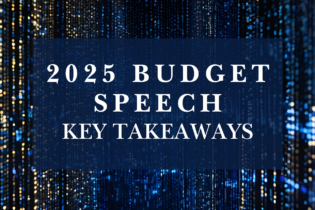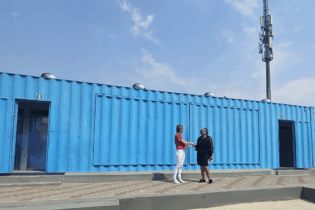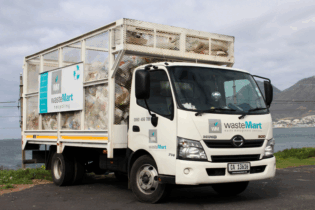Lizette van der Walt is a lawyer specialising in environmental law. In her 27 years of experience, she noticed a general confusion around environmental laws in South Africa and decided to help by creating the Enviro Legal app.
This app is designed to help users navigate the world of environmental legislation through expert and up-to-date data. Infrastructure News sat down with her to pick her brain about the scope of environmental law in South Africa and the app she created to help people.
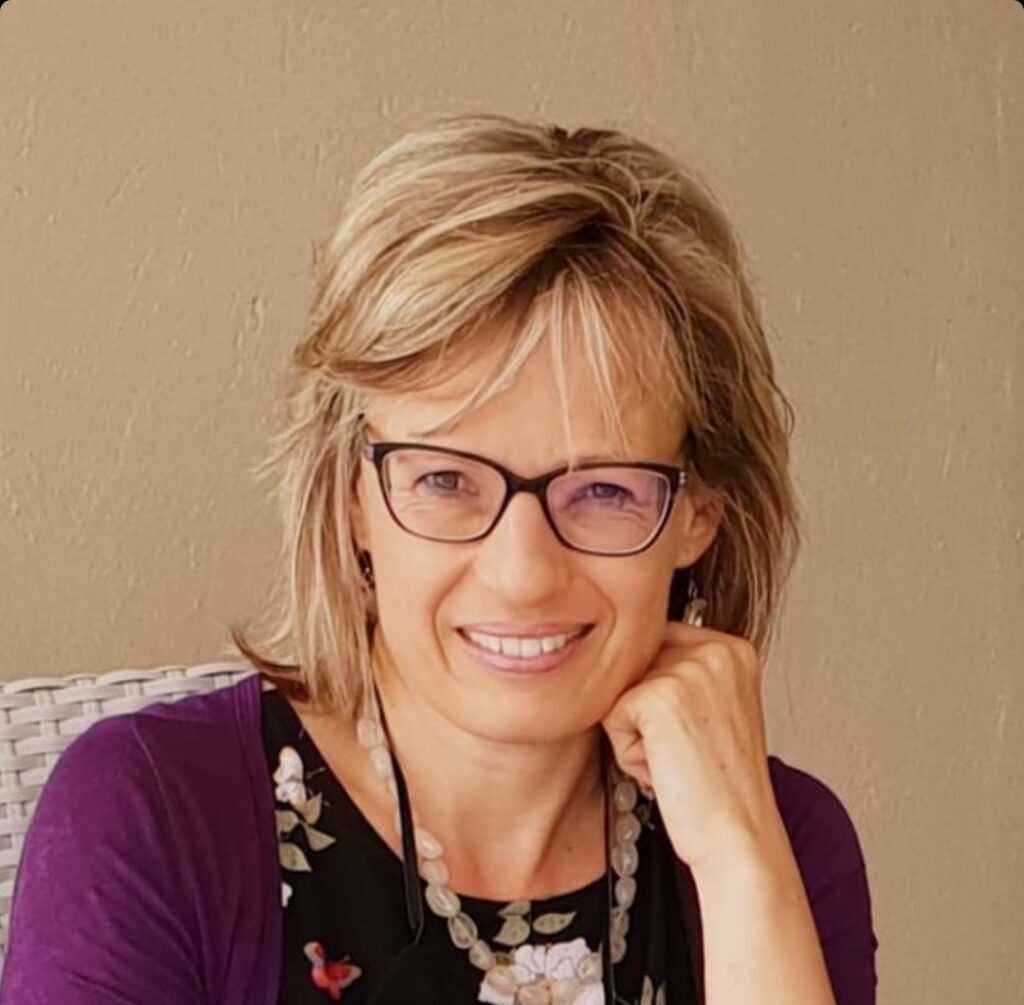
Lizette van der Walt, environmental lawyer and creator of the Enviro Legal App
Can you comment on why environmental law is so fragmented and uncertain?
South Africa has many laws in separate acts that govern water, air, and waste management, some of these laws dating back to the 1950s. There is no cohesive branch of ‘environmental law’ and this means that laws pertaining to the environment are often incorporated into sectoral laws including agriculture, forestry, fisheries, health, mining, energy, road, rail, aviation, etc. This fragmentation remains in South Africa to this day.
Adding to this fragmentation is that our constitution vested the power to make legislation on environmental matters in all three spheres of government. Local, provincial, and national governments have the authority to make environmental laws within their jurisdiction. This is unusual when compared to other disciplines and countries that have a more cohesive branch of environmental law.
Could you give an example of a surprising environmental law that people may not be familiar with?
I think given the relative ignorance of environmental law in South Africa I could give many examples but most of them are perfectly justified. The real disconnect is between the reality of how the laws are implemented and what the law actually wants to govern. If you drive through informal settlements and rural areas you can see that basic waste collection underpinned by the constitution is just not practised but then companies have to comply with a vast set of sophisticated laws about waste classification and waste type assessment. While the laws are good the double standards affect the morale of citizens who care about our natural resources and who wish to comply with the governing legislation. Often we see heavy fines imposed for relatively small violations in the formal sector, with raw sewage from the municipalities and alien & invader plant infestation of government-owned land not attracting any enforcement action, to name only two examples.
Who do you envision will use and get the most out of this app?
The app was designed with consulting engineers, environmental consultants and auditors, as well as financial auditors in mind.
Small and medium-sized enterprises, that cannot afford or justify the appointment of a dedicated position to remain up to date with environmental legislation and interpret the laws, will also greatly benefit.
Environmental managers in larger firms, such as mining companies, will definitely also find a friend in the App, as it will significantly cut both time and money spent on updating their knowledge and obtaining specialist legal advice.
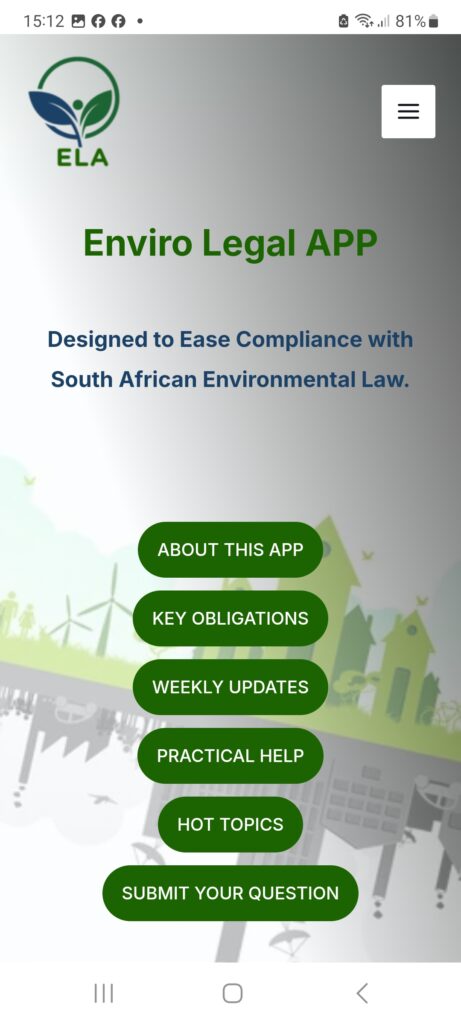
Home page of the app on the mobile version
What led to the decision to create this app?
I realised that newly qualified environmental management and environmental science graduates had no, to very little, exposure or training in environmental laws as part of their curriculum. Even seasoned environmental managers with many years of experience still struggle to develop a working knowledge of the applicable environmental laws. This reality often gives rise to very expensive errors and exposes personal liability for environmental offences created in the workplace. I hope to provide a tool for persons who are expected to have knowledge of environmental law, but who either do not have the resources or time to become environmental legal experts.
What exactly is the “screening tool” under Key Obligations and how should it be used?
I categorised, sub-categorised and indexed all the regulated activities into meaningful sections, such as “authorisation requirements”, “registration requirements”, “operational requirements” and “submission requirements”.
Each of these sections has an index to guide the user to a very brief description of the requirement. In today’s rushed working world these depictions were made to be read in a minute.
This brief description is then hyperlinked to the full text of the updated legislative text. This tool reduces the need to sift through large amounts of unorganised information. A consolidated database of all the updated legislation is also provided. A search function has also been designed to further streamline the identification of specific information. I anticipate that this will be the most-used function of the App.
The app has a weekly updated feature, what will a user likely see at the end of a week?
The weekly update is provided on Mondays to ensure that the preceding Friday’s gazettes are incorporated. The weekly update merely lists the new or changed laws promulgated during the previous week. It also indicates to whom the change would be of interest and includes a hyperlink to the full text of the gazette. Interpretation of the new laws, where necessary, is provided under the “Hot Topics” functions. By staying up to date on a weekly basis the users can avoid being overwhelmed by quarterly or annual updates.
The app offers “practical help” Could you elaborate on what sort of help, on what topics, and how it is presented?
Topics that present specific interpretation challenges, as encountered in my enviro law practice over a period of 27 years, are unpacked under “Practical Help”. Training videos are provided on aspects such as waste classification, waste type assessments, waste manifests, stormwater monitoring, water balances etc. Other tools include audit checklists for waste recyclers, informative links on greenhouse gas emission estimation, general awareness videos on ozone depletion, a list of all the banned substances in SA, and compatibility guidelines for dangerous goods storage, to name a few. Links to other useful and reputable websites are also provided. Users are invited to suggest topics to be addressed by this function.
What kinds of questions do you anticipate from the “submit a question feature” or What do you think the users will most likely be unaware of or need help with?
I already spend approximately 30% of my time answering, “quick questions”, and I have a fair idea of what to expect. I expect that professionals will request guidance with the identification of prior authorisation requirements during the early planning phases of new projects for their clients, as well as guidance with an interpretation of the legislation – many of the laws are open to more than one interpretation and interaction with officials are often required to flesh out the intention of the legislation. Environmental officers and managers, I suspect, will ask for guidance with the review of documentation submitted by their service providers, assistance with environmental clauses for contracts, identification of water, waste, atmospheric emission and other environmental licensing requirements, and assistance with reportable environmental incidents, among others.
The app is available as a web version here and available for Android mobile phones on the Google Play Store.
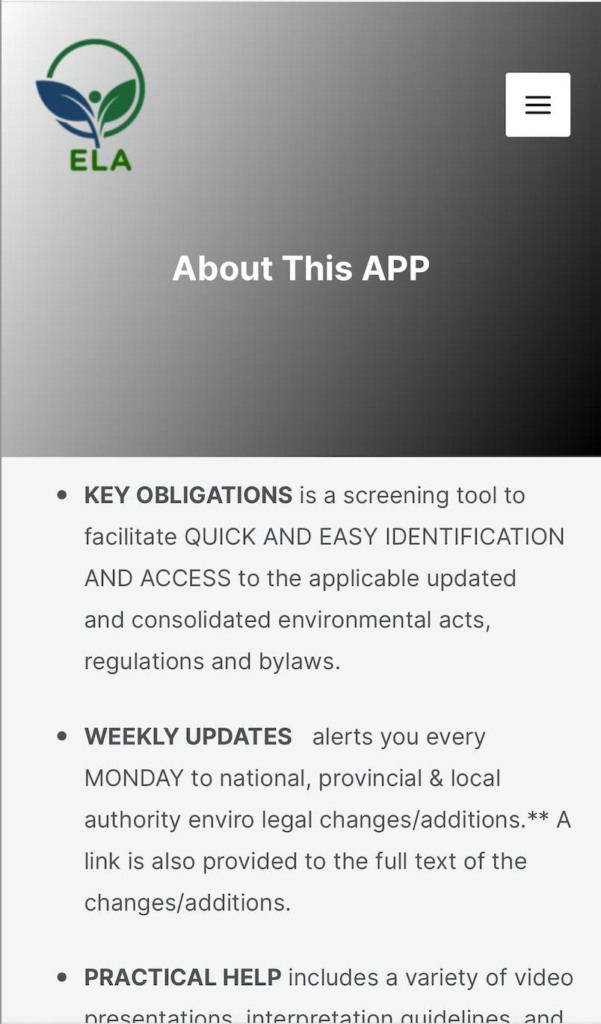
About section on the mobile version of the app


